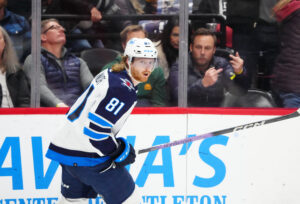Much was made of the biggest difference between the Minnesota Wild‘s hardened veterans and the Vancouver Canucks postseason rookies. It was the vaunted Wild defence against the Canucks young forwards. And for one game at least, that story played itself out exactly to script.
Youth and Vigour vs Age and Cunning
Neither is a completely accurate description of either team, of course. But it’s hard to ignore how the games played out, and who the pivotal players of each team were.
Youth and Vigour
Ask 100 who the most important players for the Vancouver Canucks are, and you’ll hear the same few names. Elias Pettersson. Brock Boeser. Quinn Hughes. Jacob Markstrom, of course. All of them combined had a grand total of zero games in the NHL’s post-season. Yes, even Markstrom. Despite a decade-long career, he was a playoff neophyte.
And it showed.
All through the first play-in game, the nerves were there. Hughes rushed his shots. Boeser, who hadn’t scored in his last 12 regular-season games, had splinters coming out of his graphite stick. Markstrom whiffed on what had been an easy stop during the regular season. Pettersson was unsure how to react to wearing Wild player after Wild player like a bad crest.
Age and Cunning
The long, LONG break proved kind to the Canucks, letting Boeser, Markstrom, and Chris Tanev all heal injuries. But it also let the top scorers of the Wild – five of the top six being 30+ years old – rest up, too. Ryan Suter alone had 78 playoff games under his belt, never mind the scores more from Eric Staal, Zach Parise, Mikko Koivu…
Even new coach Dean Evason had playoff experience, though never as a head coach. But no matter: he had the team’s trust, and he had a system. And more than that, he had the veterans to make the system work. Yes, in Game One the Canucks managed 28 shots on Alex Stalock, but few were dangerous.
The Minnesota Wild veterans played a cool, controlled game, earning Stalock a shutout while the Canucks postseason rookies took 25 minutes in penalties.
A Funny Thing Happened…
…on the way to their sweep. Those Vancouver Canucks postseason rookies grew up.
If there’s a single moment that marks a turn in two teams’ fortunes, it is Tanner Pearson‘s goal. That strike 25 seconds into Game Two wasn’t just proof that the Canucks could score. It was a lead. And a lead always makes it easier to play your game.
The change was night and day. It was as if the Canucks remembered that they were a fast team – and if there’s one thing old men hate to do, it’s running after those dang kids! The young players found their legs and Minnesota was left to chase them down. Losing top-nine player Micheal Ferland didn’t slow them down. Taking early penalties only increased their momentum. Even giving up a short-handed goal didn’t cow them.
Veterans led the way in scoring, but the youth kept their control. Watching Hughes slow play down on entry and make deliberate choices was chilling. But not so much as Pettersson adjusting his helmet and deciding This is Playoffs, Then? Fine. I Can Do That.
And that doesn’t promise good things for the Wild.
Still to come
Minnesota can still take good news from the series. Super-shooter Kevin Fiala has powered three shots through Markstrom in two games. Stalock has one more shutout than Markstrom does. That the series is still sawed off at one game apiece. They do have the players who have been here before, and they’re never a joy to play against. And the Canucks might be missing two, possibly three forwards next game. And, famously, momentum in sports isn’t a real thing.
The problem is, the Vancouver Canucks postseason rookies aren’t gaining momentum – they’re gaining experience. And that’s a lot harder to beat.
Main photo:






